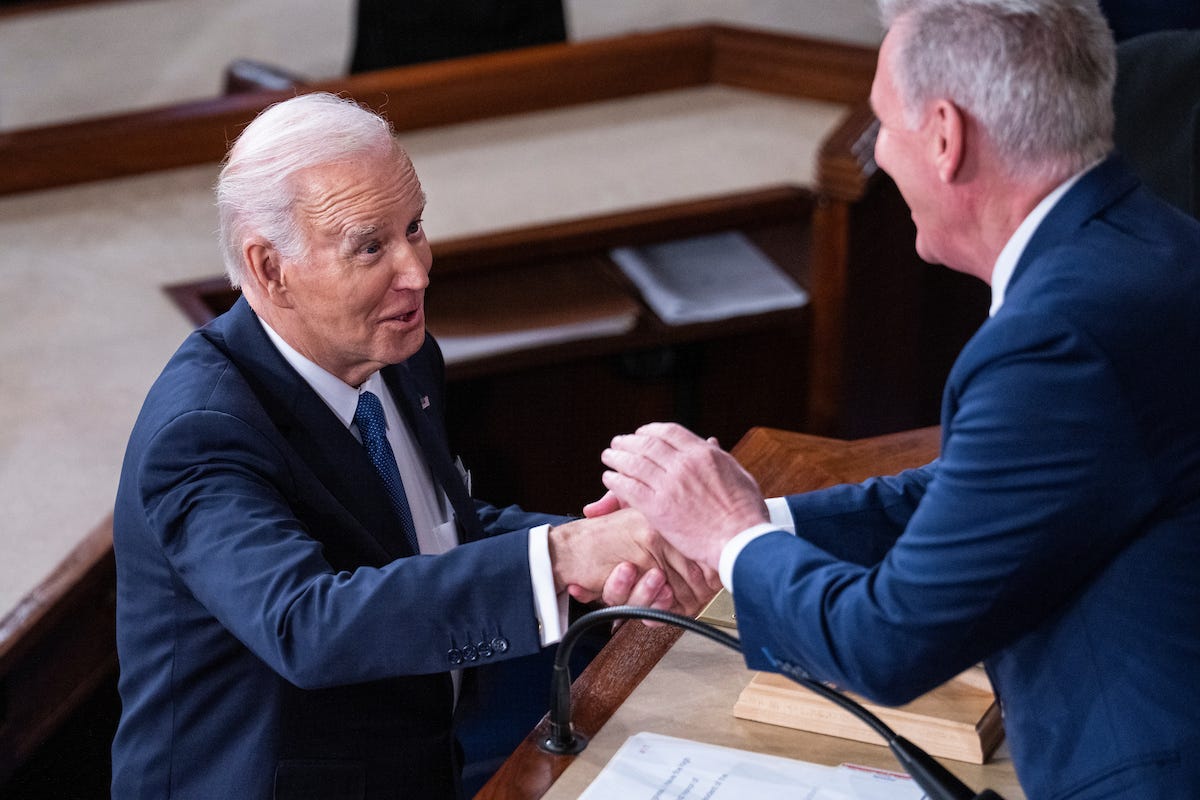What Does Debt Limit Drama’s Surprising Conclusion Mean for U.S. Politics?
This surprising result probably boosts Biden's future prospects, but may cause big problems for Speaker McCarthy
I argued in my previous post that I thought a bipartisan debt limit deal was unlikely, but that such a deal would be the best possible result given the uncertainty outcome of Biden declaring the debt limit law to be unconstitutional or the economic disaster of default. Well, barring craziness occurring in the Senate, it looks like the unlikely has occurred. It is worth spending some time analyzing why it happened this way and what it all means.
First, I am surprised it happened this way because I did not think Kevin McCarthy had the stature or confidence to do a bipartisan deal that would require substantial Democratic support in the House. There was little in his past history to suggest that he was interested or capable of being a bipartisan dealmaker. But, to his credit, he demanded that this crisis be resolved through a bipartisan negotiation, showed that his unruly caucus could pass a debt limit extension (albeit with politically dead-end conditions attached to it), and then engaged in good faith negotiations with the White House.
But the result is stunning and I can’t help but believe that it spells trouble for McCarthy in his own caucus. Using the debt limit to force dramatic change in fiscal policy was the core demand of those elements of the GOP House caucus who opposed McCarthy’s speakership and forced 15 humiliating votes in order to extract a set of rules and back room promises on how McCarthy would handle this issue. The high-water mark for McCarthy’s opponents during the speakership contest was 21 GOP votes. But on the debt bill, McCarthy lost 71 members of his caucus and passed legislation with more Democratic votes (165) than Republican votes (149).
This is close to an apostasy within the GOP. For far lesser sins than this, Speakers Hastert, Boehner, and Ryan were either shown the door by the right flank of the party or had life made so miserable that they happily left voluntarily.
With this breach of trust with about 1/3rd of this caucus, McCarthy will have great difficulty mustering 218 of his 223 caucus members to pass GOP-only legislation again in this Congress. This means that just like last night, House Democratic Leader Hakeem Jefferies, holds a lot more power than the average minority leader. The budget bill only passed because Jefferies held up his green card giving Democrats permission to support the procedural rule bringing the debt limit bill to the House floor. If there are additional must-pass pieces of legislation in this session of Congress – it won’t happen unless House Democrats approve. That is good for the country, but probably bad for McCarthy’s in this era of hyper-partisanship.
Can McCarthy’s speakership survive? According to the rules negotiated during the speaker elections in January, any single member can bring a snap resolution to the floor calling for the speaker to be removed. Assuming that the debt-limit betrayal means that McCarthy has lost a couple dozen GOP supporters, he will be beholden, again, to Democrats to vote against his removal in order to remain in the Speaker’s chair. For that, Mr. Jefferies will be able to extract a price.
What does the deal mean for Biden?
I think it is mostly good. Biden had to agree to lower levels of spending for non-entitlement domestic programs, but that was the foregone result of losing the House in 2022. I don’t think there would have been any higher spending levels for these programs had the negotiations taken place in the context of a deal over annual spending bills instead of this potential default scenario. And it also seems to me that while Biden had to make some policy concessions, he maintained the integrity of all of his major accomplishments like the climate provisions of the Inflation Reduction Act and important health care improvements. Also, Biden inserted caveats to most of the GOP’s policy victories. It is a bit of a delicious irony that, with respect to the new work requirements for food stamps that Republicans demanded so vociferously, the agreement’s waiver of work requirements for veterans, the homeless, and young people transitioning from foster care will result in an increase in enrollment for this program, thereby increasing deficit spending.
Biden also forced the GOP to exclude Social Security and Medicare from the budget axe at the onset of this crisis, which he will use during the election to frame himself as the ultimate protector for these popular programs. And by forcing the GOP to pass a budget bill prior to opening negotiations, he put them on record as favoring large scale cuts to popular domestic programs – like military spending, veterans’ health care, law enforcement, student aid and so on, which will, again, be electoral assets for him. And by insisting cuts in IRS enforcement funding – the GOP is again on record as supporting high earning tax cheats.
Most importantly, Biden emerges from this episode with his image as the responsible statesman willing to work on a bipartisan basis both intact and enhanced. Default has been avoided without too bad a reduction in fiscal stimulus. Additional budget crises have been delayed until after the election. At least this one barrier to economic growth has been removed. This is the kind of stability Biden can use as a contrast to the likely GOP nominee Mr. Trump, the king of chaos.
Democrats should make getting rid of the debt limit a top priority because it is bad governance, irrational, and harmful to progressive causes. But that is a project that Biden could take on if he wins a second term.






Good points. We will see how long McCarthy lasts. I give him fewer than six months.
Agree that they will try to scuttle the deal but they will get overwhelmed.